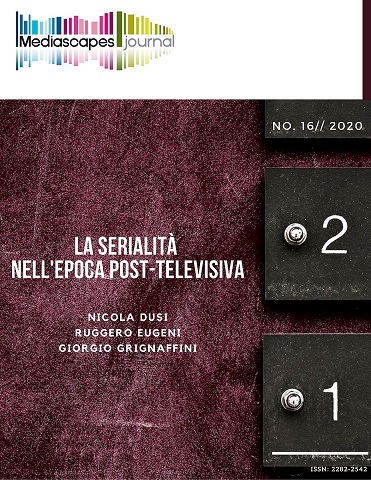Distopie contemporanee: Bandersnatch come evento seriale
Parole chiave:
Dystopia, Premediation, TV series, Black Mirror, InteractivityAbstract
The article investigates new forms of dystopic narration in relation to the emerging phenomenon of TV series and broader culture of media consumption. The spectacle of contemporary fragility is at the same time pre-mediated by hyperdiegetic narrations reproduced by the daily consumption of these media products. Zombies, vampires, lycanthropes, and all the kinds of monsters that used to inhabit the post-apocalyptic imagery have been introjected by human and post-human characters, struggling against both their interior consciousness and their technological and media prosthesis. In so doing, narratives of a dystopic future build a link with our post-media present, pointing to a wider cultural/epistemological issue. Reflexively, the same dystopic universe expands its limits by locating within its narrative and media structure the subjective and social experience of the audience. In this respect, the anthological series Black Mirror is emblematic in both representing and reproducing a diegetic and medial collapse between dystopic fiction and reality. In particular, the episode “Bandersnatch” actualizes this narrative and its temporalities in terms of interactivity as a mode of consumption. The spectator-user rather than being actually engaged in the narrative construction of the episode, is further integrated in the serial reproduction of the text itself, and of the dystopic media ecosystem in which both the episode and the audience’s experience occur.
##submission.downloads##
Pubblicato
Come citare
Fascicolo
Sezione
Licenza
Gli autori che pubblicano su questa rivista accettano le seguenti condizioni:
- Gli autori mantengono i diritti sulla loro opera e cedono alla rivista il diritto di prima pubblicazione dell'opera, contemporaneamente licenziata sotto una Licenza Creative Commons - Attribuzione che permette ad altri di condividere l'opera indicando la paternità intellettuale e la prima pubblicazione su questa rivista.
- Gli autori possono aderire ad altri accordi di licenza non esclusiva per la distribuzione della versione dell'opera pubblicata (es. depositarla in un archivio istituzionale o pubblicarla in una monografia), a patto di indicare che la prima pubblicazione è avvenuta su questa rivista.
- Gli autori possono diffondere la loro opera online (es. in repository istituzionali o nel loro sito web) prima e durante il processo di submission, poiché può portare a scambi produttivi e aumentare le citazioni dell'opera pubblicata (Vedi The Effect of Open Access).


